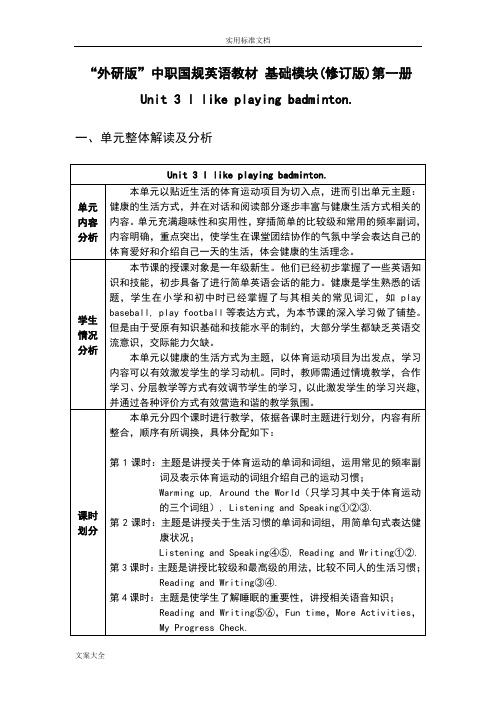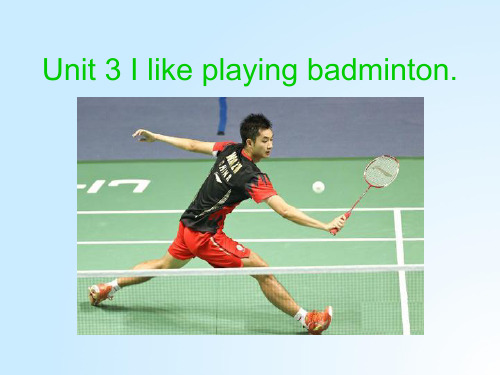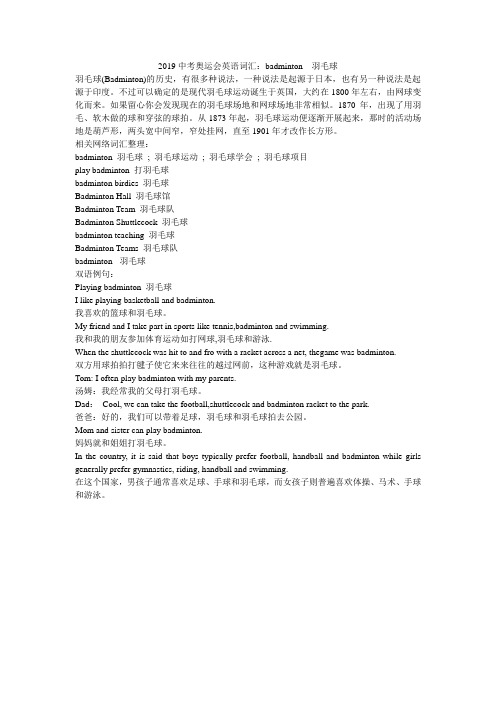unit3 I like playing badminton
五年级上册英语笫三单元a、b部分课文

五年级上册英语笫三单元a、b部分课文全文共3篇示例,供读者参考篇1Unit 3 A, B Part Text of Grade 5A. Dialogues1. A: Hi, Lucy. Do you like playing badminton?B: Yes, I do. How about you?A: I like it, too. Let’s play together this weekend.B: Sounds great!2. A: Excuse me, can you tell me the way to the post office?B: Sure. Go straight ahead and turn left at the first corner. It’s next to the library.A: Thank you so much.3. A: What are you doing, Mike?B: I’m making a birthday card for my mom.A: That’s so thoughtful. I’m sure she’ll love it.B: I hope so.4. A: What’s your favorite sport, Amy?B: I like swimming the most. It’s great fun.A: I agree. I love swimming, too.B. ReadingText A: A Trip to the Science MuseumLast Saturday, my classmates and I went to the Science Museum. It was an amazing experience. We saw many interesting exhibits and learned a lot about science. There were interactive displays where we could try different experiments. The highlight for me was the planetarium show. I was fascinated by the stars and planets. Overall, it was a fantastic trip.Text B: Tom’s New PuppyTom was very happy because his parents bought him a new puppy for his birthday. He named the puppy Buddy, and they became best friends. Tom took good care of Buddy, feeding him, playing with him, and taking him for walks. They spent a lot of time together and had a lot of fun. Tom was grateful for his new little companion.This unit focuses on conversations and reading texts that involve everyday situations and experiences. The dialoguesintroduce common topics such as hobbies, directions, activities, and preferences. The reading texts provide examples of narratives that describe events or experiences. The language used is simple and accessible to fifth-grade students, allowing them to engage with the material and practice their English skills.Overall, Unit 3 A, B of Grade 5 is a well-rounded and engaging module that helps students improve their English proficiency through dialogues and reading texts. It offers a variety of topics and situations for students to explore and learn from, making it a valuable resource for English language learners.篇2Unit 3: Can We Be Friends?Part AHi, I’m Lily. I’m a new student. I want to make more friends. But it’s hard for me to talk to others. Can you help me?Hi, Lily! Sure, I can help you. Let’s walk around the school and meet some friends.Great! Thank you. Oh, look! There is Tom. He’s playing football.Hi, Tom! I’m Lily. Can we be friends?Hi, Lily. Sure, we can be friends. I like playing football. Do you want to play with us?Sure! I’d love to. Thank you, Tom.No problem, Lily. Let’s go.Hello, Lily. This is Emily. She likes drawing. Do you like drawing, too?Hi, Emily. Nice to meet you. Yes, I like drawing. Can we draw together?Of course, Lily. Let’s go to the drawing room.Thanks, Emily. I’m so happy to have new friends.It’s great to have yo u as our new friend, Lily.Yes, we’re all friends now. Lily, Tom, and Emily. Let’s play and draw together.Part BHey, Lily. What are you doing?Hey, Tom. I’m reading a book. It’s so interesting.Oh, can I borrow it after you finish reading?Sure, Tom. I can lend it to you. Do you like to read books, too?Yes, I enjoy reading books. Reading can take you to different places and meet interesting characters.That’s true, Tom. I love reading books as well. We have something in common.Yes, we do, Lily. It’s wonderful to have friends who share the same interests.Hey, Lily and Tom. I just finished my drawing. Do you want to see it?Sure, Emily. L et’s take a look. Wow, it’s beautiful! You’re so talented.Thank you, Lily. I’m glad you like it. I enjoy drawing very much.You’re really good at drawing, Emily. I wish I could draw like you.You can, Lily. Just practice more and you’ll improv e. I can teach you some tips if you’d like.Thank you, Emily. I’d love to learn from you. Friends help each other improve, right?Yes, Lily. That’s what friends are for. We support and encourage each other to become better. Let’s keep learning and growing together.I agree, Emily. I’m grateful to have friends like you and Tom. Let’s continue to be there for each other and have fun together.篇3Unit 3: TravellingPart AHello! My name is Sarah. I love travelling to different countries. Travelling is a lot of fun. I get to see new places, learn about different cultures, and try new food. I have been to many countries like China, Australia, and France.In China, I visited the Great Wall of China. It was amazing! The wall is very long and old. I also tried Chinese food like dumplings and noodles. They were delicious! In Australia, I went to the Sydney Opera House. It is a beautiful building by the sea. I also saw kangaroos and koalas at the zoo. In France, I saw the Eiffel Tower. It is very tall and sparkly at night. I also tried French croissants and macarons. They were yummy!Travelling can be tiring sometimes, but it is always worth it. I love meeting new people, making new friends, and learning new things. I can't wait for my next trip!Part BHi, I'm Jack. I also enjoy travelling. Last summer, my family and I went on a road trip across the United States. We visited many different states like California, Texas, and New York. It was a long trip, but we had a lot of fun.In California, we went to Disneyland. It's a famous amusement park with lots of rides and characters. I even got to meet Mickey Mouse! In Texas, we visited the Grand Canyon. It is a big hole in the ground with beautiful views. We also tried Texas barbecue, which was delicious. In New York, we saw the Statue of Liberty. It is a big statue in the sea. We also went shopping on Fifth Avenue and saw a Broadway show.Travelling with my family was a great experience. We sang songs, played games, and took lots of pictures. I can't wait for our next road trip! Traveling is a wonderful way to make new memories and experience new things. I love exploring the world and all it has to offer.。
高中英语:unit3-I Like Playing Badminton课件

Sentences: I usually play tennis with my sister. Kate goes jogging every morning.
In this class Learn to:
1. describe a healthy lifestyle; 2. develop a healthy lifestyle.
If not, what should you do to make a change改变?
Example 1 :
Yes, I think I have a healthy lifestyle. I love playing ________. I often play _________ with my classmates after school. … I also eat a lot of _____ and _____ every day. …Getting enough sleep can help me keep ______, so I always go to bed early….
ቤተ መጻሕፍቲ ባይዱ
Reading and Writing
3 Read again and fill. 再读上文,填写下表。
Amy
Jack
gets up at 6:30
gets up late
goes jogging for about 30 minutes
watches TV until midnight
has breakfast at 7:30
Unit 3
I like playing badminton.
Revision and leading in
Vocabulary: go hiking play badminton play ping-pong play tennis play football
外研中职国规英语教材基础模块(修订版)第一册unit3Ilikeplayingbadminton

“外研版”中职国规英语教材基础模块(修订版)第一册Unit 3 I like playing badminton.一、单元整体解读及分析Unit 3 I like playing badminton.单元内容分析本单元以贴近生活的体育运动项目为切入点,进而引出单元主题:健康的生活方式,并在对话和阅读部分逐步丰富与健康生活方式相关的内容。
单元充满趣味性和实用性,穿插简单的比较级和常用的频率副词,内容明确,重点突出,使学生在课堂团结协作的气氛中学会表达自己的体育爱好和介绍自己一天的生活,体会健康的生活理念。
学生情况分析本节课的授课对象是一年级新生。
他们已经初步掌握了一些英语知识和技能,初步具备了进行简单英语会话的能力。
健康是学生熟悉的话题,学生在小学和初中时已经掌握了与其相关的常见词汇,如play baseball, play football等表达方式,为本节课的深入学习做了铺垫。
但是由于受原有知识基础和技能水平的制约,大部分学生都缺乏英语交流意识,交际能力欠缺。
本单元以健康的生活方式为主题,以体育运动项目为出发点,学习内容可以有效激发学生的学习动机。
同时,教师需通过情境教学,合作学习、分层教学等方式有效调节学生的学习,以此激发学生的学习兴趣,并通过各种评价方式有效营造和谐的教学氛围。
课时划分本单元分四个课时进行教学,依据各课时主题进行划分,内容有所整合,顺序有所调换,具体分配如下:第1课时:主题是讲授关于体育运动的单词和词组,运用常见的频率副词及表示体育运动的词组介绍自己的运动习惯;Warming up, Around the World(只学习其中关于体育运动的三个词组), Listening and Speaking①②③.第2课时:主题是讲授关于生活习惯的单词和词组,用简单句式表达健康状况;Listening and Speaking④⑤, Reading and Writing①②. 第3课时:主题是讲授比较级和最高级的用法,比较不同人的生活习惯; Reading and Writing③④.第4课时:主题是使学生了解睡眠的重要性,讲授相关语音知识;Reading and Writing⑤⑥,Fun time,More Activities,My Progress Check.二、分课时教学设计第1课时教学目标语言知识目标:能够初步掌握常用频率副词,如always, often,sometimes, never, usually等的用法。
英语自我介绍带翻译3篇

英语自我介绍带翻译3篇英语自我介绍带翻译3篇1(576字)I'm very glad to join in the interviw.First,let me introduce myself to you.My name is Lin YA Qian,I'm 20 years old,I come from Zhe Jiang,and I'm an outgoing girl,I like philosophy and sport.Oh yes,I hope that I can do something for the Beijing Olympics.If you give me the great chance,I won't let you disappoint.Ok,that's all.I hope that you are satisfied with me,thank you!中文版:各位领导,给位招聘官,大家好!很高兴能参加这次面试,首先让我做个自我介绍,我叫林雅倩,今年21岁,来自浙江,曾经做过网管的工作,学到了很多东西。
我是一个很活泼开朗的男孩,喜欢哲学和运动。
这次北京举办奥运会,我很希望能做点什么,如果贵公司给我这个机会,我想我不会让你失望的'。
简单介绍到这,希望能我今天的表现能令您满意,谢谢!英语自我介绍带翻译3篇2(422字)How are you, I call .This year is 22 years old.Graduate from college.The profession is a calculator mu am one is bright,optimism, there is the person of responsibility.A fondness for plays basketball, computer, listen to music, etc..Thankful your company gives me this the opportunity of the personal interview!你好,我叫。
中职英语基础模块修订版(上)unit3 I like playing badminton第一课时

2) 讨论Is it healthy or unhealthy?随机提问
根据P28⑤Read and discuss的内容对学生 进行提问: What is Sam doing at ... ?
3)
运用本节课学习及总结的词组描述自己周末 一天的活动,并评价每个活动healthy or unhealthy。每组派代表发言 Time 10: 00am 12: 00am 1:00pm 3: 00pm 7: 00 pm Activity Having dancing classes Having lunch Taking a nap Playing ping-pong Taking a walk Watching TV
播放第二遍录音。 1)补全文本材料。 Sam: What do you do , Amy? Amy: I usually with my sister. It’s a lot of fun. Sam: Great! But I like . Amy: Who do you often ? Sam: Mary, my cousin. 2) 答案 Usually, after school, play tennis, a lot of fun, playing, pingpong, play with
1)
What sports do you like playing? I like playing… 2) What kind of sports do you often do? I often…
4. New words
Always 总是 Often 常常 Sometimes 有时 Never 从来不 Usually 通常
外研版七上Unit3《What's your favourite sport》

Let’s learn:
/iŋ/
动词加-ing 的构成方法: 1.直接+ing 2. 以一个元音音标加+一个辅音音标结尾的单词, 双写最后一个字母再+ing 3.以不发音的“e”结尾的单词去e再+ing
sing play read walk watch listen
singing playing reading walking watching listening
A: What’s your favourite sport?
A: My favourite sport is swimming. = I like swimming in summer.
swimming
table tennis
play table tennis
I like playing table tennis. My favourite sport is playing table tennis. Playing table tennis is my favourite sport.
Homework:
1.Listen and read the dialogue.
2.Finish exercises of Unit3.
3.Revise Module 4.
Goodbye!
1. Listen and repeat.
• 1. basketball
2. football
3. swimming
4. table tennis
2.Listen and number.
3
1
4
2
3. Listen and read
Tony: What’s your favourite sport, Daming? Daming: Football. Tony: It’s my favourite sport too! Daming: Let’s play football after school. Tony: OK. Good idea!
打羽毛球翻译成英文

打羽毛球翻译成英文打了这么久羽毛球的你,知道打羽毛球用英文怎么说吗?以下是小编为大家带来的关于打羽毛球翻译成英文,希望能给大家带来帮助!To play badminton打羽毛球的英文短语:1、比如打羽毛球Such as playing badminton ; Badminton ; Like to play badminton2、正在打羽毛球Play badminton ; Currently playing badminton ; Is to play badminton3、学打羽毛球How to Play Badminton4、喜欢打羽毛球like playing badminton5、我打羽毛球I Play Badminton6、我们打羽毛球We Play Badminton7、我喜欢打羽毛球i like play badminton ; I like playing badminton ; I like to play badminton8、我经常打羽毛球I often play badminton ; I play the badminton frequently ; I am often playing badminton9、打羽毛球的好处Benefits of playing badminton羽毛球专业术语中英文对照:I.球与球拍用语Racket, bat球拍racket head 球拍前部(包括拍框和拍面)face of racket, racket face 拍面frame of racket 拍框handle of racket 拍柄shaft [ʃɑ:ft] 拍杆shuttle, shuttlecock羽毛球feather 羽毛cork[kɔ:k] base 球托broken shuttle 坏球facet ['fæsit] 八角形拍把上的一个平面plastic shuttle 塑料羽毛球II.场地用语1、关于场区court 球场doubles court 双打球场singles court 单打球场backcourt 后场backcourt player 后场球员forecourt 前场forecourt player 前场球员singles service court 单打发球区doubles service court 双打发球区service court 发球区left court 左场区left service court 左发球区right court 右场区right service court 右发球区alley 单打线和双打线之间的细长地带2、关于场地线条centre line, mid court line 中线side line, side boundary line 边线inside side line 单打边线outside side line 双打边线corners of backcourt 后场两角doubles service line 双打发球线front service line, short service line 前发球线rear service line, long service line (双打)后发球线back boundary line, backcourt boundary端线(单打后发球线)net post 网柱net tape, white tape, band网顶白布条III.击球技术用语1、关于握拍forehand 正拍backhand 反拍grip 握拍法backhand grip 反手握法forehand grip 正手握拍法2、关于击球动作与球路flick [flik] 甩腕击球swing of the arm 摆臂swing of the body 身体旋转swing of the racket 挥拍backswing 向后旋拍(准备击球)deception 假动作preliminary [pri'liminəri]( 初步的, 预备的,准备工作)feint [feɪnt](佯攻)(发球时的)假动作delivery of service 发球动作full strike 全力击球full swing 全力挥拍high backhand stroke 上手反手击球overhand stroke 高于头顶的击球overhead stroke 位于头顶的击球round-the-head stroke 绕头顶击球shoulder-high drive齐肩的平抽球side-arm stroke 击侧身球underhand stroke 低手击球strike 击(球)cut 切球smash [smæʃ] 杀球forehand smash正手杀球backhand smash反手杀球Around the head smash头顶杀球consecutive [kən'sekjutiv](连续的) kill连续扣杀drive平抽球return回球retrieve [ri'tri:v] 救球rushing ①上网②扑球sliding step 滑步footwork步法drop shot 吊球drive 平抽net play 网前Net shot网前放小球、网前搓球Net kill 网前扑球Net lift网前挑球(推后场)clear 平高球high clear 高远球cross-court 斜线球deep shot 深球(打到对方底线附近的球) driven clear 平抽高球lift 近网挑球straight 直线球descent (球)下降flight (球)飞行3、关于发球接发球Deep high service, long high service发高远球Short low service 发网前小球Flick serve 发平高球Drive serve, flat service发低平球return of service 接发球4、其它basic strokes 基本技术abnormal flight (球)飞行不正常accuracy of placement 落点的准确性miss 击球未中IV. 战术用语front and back 前后站位打法rotation [rəʊ'teɪʃən]旋转,转动system 轮转配合打法half-court shot 半场球(对付前后站位防守的打法)defense and fight back防守反击net game/play网前打法players’ positions 队员方位看过"打羽毛球翻译成英文"的人还。
2019中考奥运会英语词汇:badminton 羽毛球

2019中考奥运会英语词汇:badminton 羽毛球羽毛球(Badminton)的历史,有很多种说法,一种说法是起源于日本,也有另一种说法是起源于印度。
不过可以确定的是现代羽毛球运动诞生于英国,大约在1800年左右,由网球变化而来。
如果留心你会发现现在的羽毛球场地和网球场地非常相似。
1870年,出现了用羽毛、软木做的球和穿弦的球拍。
从1873年起,羽毛球运动便逐渐开展起来,那时的活动场地是葫芦形,两头宽中间窄,窄处挂网,直至1901年才改作长方形。
相关网络词汇整理:badminton 羽毛球; 羽毛球运动; 羽毛球学会; 羽毛球项目play badminton 打羽毛球badminton birdies 羽毛球Badminton Hall 羽毛球馆Badminton Team 羽毛球队Badminton Shuttlecock 羽毛球badminton teaching 羽毛球Badminton Teams 羽毛球队badminton- 羽毛球双语例句:Playing badminton 羽毛球I like playing basketball and badminton.我喜欢的篮球和羽毛球。
My friend and I take part in sports like tennis,badminton and swimming.我和我的朋友参加体育运动如打网球,羽毛球和游泳.When the shuttlecock was hit to and fro with a racket across a net, thegame was badminton.双方用球拍拍打毽子使它来来往往的越过网前,这种游戏就是羽毛球。
Tom: I often play badminton with my parents.汤姆:我经常我的父母打羽毛球。
Dad:Cool, we can take the football,shuttlecock and badminton racket to the park.爸爸:好的,我们可以带着足球,羽毛球和羽毛球拍去公园。
- 1、下载文档前请自行甄别文档内容的完整性,平台不提供额外的编辑、内容补充、找答案等附加服务。
- 2、"仅部分预览"的文档,不可在线预览部分如存在完整性等问题,可反馈申请退款(可完整预览的文档不适用该条件!)。
- 3、如文档侵犯您的权益,请联系客服反馈,我们会尽快为您处理(人工客服工作时间:9:00-18:30)。
听录音,学习下列词语。
打网球 打盹儿
散步 打乒乓球
Listening and Speaking
2
Listen and practice. 听录音,练习谈论课后活动。
Sam: What do you usually do after school, Amy? Amy: I usually play tennis with my sister. It’s a lot of fun. Sam: Great! But I like playing ping-pong.
play basketball
play ping-pong
go jogging
Key sentences:
Warming up
go hiking
去徒步旅行
Warming up
go swimming
去游泳
Warming up
play badminton
打羽毛球
Warming up
play basketball
A good night’s sleep makes us feel fresh and bright. Sleeping is even
more important for teenagers. It helps them grow taller and stronger. Therefore, teenagers should get at least eight hours of sleep every
do shopping do reading
my sister. It’s a lot of fun. S1: Great! But I like doing reading. S2: Who do you often read with?
S1: Mary, my cousin.
Listening and Speaking
根据示例谈论萨姆的活动。
What is Sam doing at 3:00 in the afternoon? He is playing ping-pong.
Listening and Speaking
5 Read and discuss.
根据示例谈论萨姆的活动。
What is Sam doing at 7:00 in the evening? He is taking a walk.
Amy: Who do you often play with?
Sam: Mary, my cousin.
参考译文
tennis:网球; table tennis:乒乓球,对话中用的ping-pong是同样的 意思。
萨姆:埃米,你放学后通常做什么? 埃米:我经常和我姐姐打网球。好玩儿极了。
萨姆:真好!不过我喜欢打乒乓球。
stress weight lose weight fresh bright teenager therefore at least
Unit 3
I like playing badminton.
Look at the picture and discuss:
1. Which sport is she playing? 2. What sports do you like playing?
的生活习惯。 Amy usually gets up at 6:30 in the morning. Then she goes jogging for about 30 minutes. She usually has breakfast at 7:30. She often has milk, an egg and some bread for breakfast. Jack often watches TV until midnight. He usually gets up late. He often eats popcorn and fast food. He never plays sports or does any outdoor activities. 读下文,比较埃米和杰克
William
参考译文
威廉:我篮球打得很好。但是我现在没有时间打 (篮球)了,因为我工作总是特别忙。
Reading and Writing
4 Read and fill.
再读上文, 为他们寻找解决问题的办法。
Suggestions:
find time to play exercise more eat fruits and vegetables do things outdoors develop healthy hobbies
eats popcorn and fast food
never plays sports or does any outdoor activities
Reading and Writing
3 Read and find. 读下文,了解下列三人各自的问题。 Lisa
I like staying at home, reading books, watching TV and listening to music. I don’t like exercising and doing things outdoors.
参考译文
葆拉:我经常吃汉堡包,喝可乐。我不喜欢(吃)
水果和蔬菜。
Reading and Writing
3 Read and find. 读下文,了解下列三人各自的问题。
I’m a good basketball player. But I have no time to play now because I’m always too busy at work.
听录音,补充萨姆周末一天活动的信息。
have breakfast
have dancing classes
have lunch
play ping-pong
take a walk take a nap watch TV
Listening and Speaking
5 Read and discuss.
根据示例谈论萨姆的活动。
Listening and Speaking
5 Read and discuss.
根据示例谈论萨姆的活动。
What is Sam doing at 8:00 in the evening? He is watching TV.
Reading and Writing
1 Read and compare.
3 Listen again and act. 再听录音,根据提示表演对话。
S1: What do you usually do after school, George? S2: I usually play basketball with
play basketball play football
my brother. It’s a lot of fun. S1: Great! But I like playing football. S2: Who do you often play with?
S1: My classmates.
Listening and Speaking
4 Listen and fill.
You’ll be able to:
1. describe a healthy lifestyle;
2. talk about sports.
Warming up
1 Listen and match.
听录音,将下列词语与图片匹配。
go hiking go swimming play badminton
打篮球
Warming up
play ping-pong
打乒乓球
Warming up
go jogging
慢跑
1. Mike plans to go hiking this weekend.
迈克打算这周末去徒步旅行。
2. Kate goes jogging every morning.
凯特每天早上慢跑。
What is Sam doing at 10:00 in the morning? He is having dancing classes.
Listening and Speaking
5 Read and discuss.
根据示例谈论萨姆的活动。
What is Sam doing at 12:00 at noon? He is having lunch.
Warming up
2 Look and tick. 看图,选出有益于健康的活动和习惯。
√ go dancing √
eat fast food
√ √ ride a bike
watch TV
Listening and Speaking
1
Listen and learn.
play tennis take a nap take a walk play ping-pong
参考译文
miil midnight:直到午夜。
埃米通常每天早上六点半起床,然后去慢跑三 十分钟。她一般七点半吃早饭,早饭经常喝牛奶, 吃一个鸡蛋和一些面包。 杰克经常看电视到半夜,早上通常起得很晚。 他经常吃爆米花和快餐,从来都不运动,也不做户 外活动。
Reading and Writing
2 Read again and fill.
再读上文,填写下表。
Amy
gets up at 6:30
Jack
gets up late
goes jogging for about 30 minutes
watches TV until midnight
